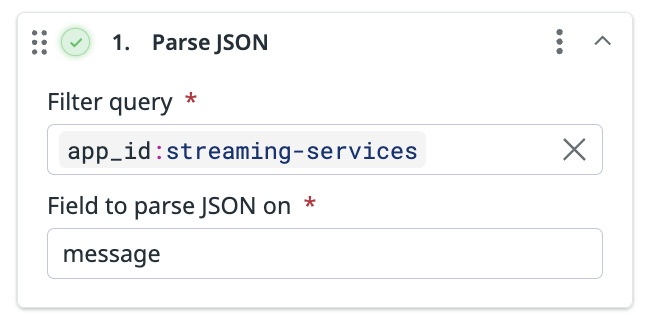- Essentials
- Getting Started
- Agent
- API
- APM Tracing
- Containers
- Dashboards
- Database Monitoring
- Datadog
- Datadog Site
- DevSecOps
- Incident Management
- Integrations
- Internal Developer Portal
- Logs
- Monitors
- Notebooks
- OpenTelemetry
- Profiler
- Search
- Session Replay
- Security
- Serverless for AWS Lambda
- Software Delivery
- Synthetic Monitoring and Testing
- Tags
- Workflow Automation
- Learning Center
- Support
- Glossary
- Standard Attributes
- Guides
- Agent
- Integrations
- Developers
- Authorization
- DogStatsD
- Custom Checks
- Integrations
- Build an Integration with Datadog
- Create an Agent-based Integration
- Create an API-based Integration
- Create a Log Pipeline
- Integration Assets Reference
- Build a Marketplace Offering
- Create an Integration Dashboard
- Create a Monitor Template
- Create a Cloud SIEM Detection Rule
- Install Agent Integration Developer Tool
- Service Checks
- IDE Plugins
- Community
- Guides
- OpenTelemetry
- Administrator's Guide
- API
- Partners
- Datadog Mobile App
- DDSQL Reference
- CoScreen
- CoTerm
- Remote Configuration
- Cloudcraft (Standalone)
- In The App
- Dashboards
- Notebooks
- DDSQL Editor
- Reference Tables
- Sheets
- Monitors and Alerting
- Service Level Objectives
- Metrics
- Watchdog
- Bits AI
- Internal Developer Portal
- Error Tracking
- Change Tracking
- Event Management
- Incident Response
- Actions & Remediations
- Infrastructure
- Cloudcraft
- Resource Catalog
- Universal Service Monitoring
- End User Device Monitoring
- Hosts
- Containers
- Processes
- Serverless
- Network Monitoring
- Storage Management
- Cloud Cost
- Application Performance
- APM
- Continuous Profiler
- Database Monitoring
- Agent Integration Overhead
- Setup Architectures
- Setting Up Postgres
- Setting Up MySQL
- Setting Up SQL Server
- Setting Up Oracle
- Setting Up Amazon DocumentDB
- Setting Up MongoDB
- Connecting DBM and Traces
- Data Collected
- Exploring Database Hosts
- Exploring Query Metrics
- Exploring Query Samples
- Exploring Database Schemas
- Exploring Recommendations
- Troubleshooting
- Guides
- Data Streams Monitoring
- Data Observability
- Digital Experience
- Real User Monitoring
- Synthetic Testing and Monitoring
- Continuous Testing
- Product Analytics
- Session Replay
- Software Delivery
- CI Visibility
- CD Visibility
- Deployment Gates
- Test Optimization
- Code Coverage
- PR Gates
- DORA Metrics
- Feature Flags
- Security
- Security Overview
- Cloud SIEM
- Code Security
- Cloud Security
- App and API Protection
- AI Guard
- Workload Protection
- Sensitive Data Scanner
- AI Observability
- Log Management
- Observability Pipelines
- Configuration
- Sources
- Processors
- Destinations
- Packs
- Akamai CDN
- Amazon CloudFront
- Amazon VPC Flow Logs
- AWS Application Load Balancer Logs
- AWS CloudTrail
- AWS Elastic Load Balancer Logs
- AWS Network Load Balancer Logs
- Cisco ASA
- Cloudflare
- F5
- Fastly
- Fortinet Firewall
- HAProxy Ingress
- Istio Proxy
- Juniper SRX Firewall Traffic Logs
- Netskope
- NGINX
- Okta
- Palo Alto Firewall
- Windows XML
- ZScaler ZIA DNS
- Zscaler ZIA Firewall
- Zscaler ZIA Tunnel
- Zscaler ZIA Web Logs
- Search Syntax
- Scaling and Performance
- Monitoring and Troubleshooting
- Guides and Resources
- Log Management
- CloudPrem
- Administration
Parse JSON Processor
This product is not supported for your selected Datadog site. ().
Overview
This processor parses the specified JSON field into objects. For example, if you have a message field that contains stringified JSON:
{
"foo": "bar",
"team": "my-team",
"message": "{\"level\":\"info\",\"timestamp\":\"2024-01-15T10:30:00Z\",\"service\":\"user-service\",\"user_id\":\"12345\",\"action\":\"login\",\"success\":true,\"ip_address\":\"192.168.1.100\"}"
"app_id":"streaming-services",
"ddtags": [
"kube_service:my-service",
"k8_deployment :your-host"
]
}
Use the Parse JSON processor to parse the message field so the message field has all the attributes within a nested object.
This output contains the message field with the parsed JSON:
{
"foo": "bar",
"team": "my-team",
"message": {
"action": "login",
"ip_address": "192.168.1.100",
"level": "info",
"service": "user-service",
"success": true,
"timestamp": "2024-01-15T10:30:00Z",
"user_id": "12345"
}
"app_id":"streaming-services",
"ddtags": [
"kube_service:my-service",
"k8_deployment :your-host"
]
}
Setup
To set up this processor:
- Define a filter query. Only logs that match the specified filter query are processed. All logs, regardless of whether they do or do not match the filter query, are sent to the next step in the pipeline.
- Enter the name of the field you want to parse JSON on.
Note: The parsed JSON overwrites what was originally contained in the field.
Filter query syntax
Each processor has a corresponding filter query in their fields. Processors only process logs that match their filter query. And for all processors except the Filter processor, logs that do not match the query are sent to the next step of the pipeline. For the Filter processor, logs that do not match the query are dropped.
The following are logs filter query examples:
NOT (status:debug): This filters for logs that do not have the statusDEBUG.status:ok service:flask-web-app: This filters for all logs with the statusOKfrom yourflask-web-appservice.- This query can also be written as:
status:ok AND service:flask-web-app.
- This query can also be written as:
host:COMP-A9JNGYK OR host:COMP-J58KAS: This filter query only matches logs from the labeled hosts.user.status:inactive: This filters for logs with the statusinactivenested under theuserattribute.http.status:[200 TO 299]orhttp.status:{300 TO 399}: These two filters represent the syntax to query a range forhttp.status. Ranges can be used across any attribute.
Learn more about writing filter queries in Observability Pipelines Search Syntax.
Further reading
Additional helpful documentation, links, and articles:

